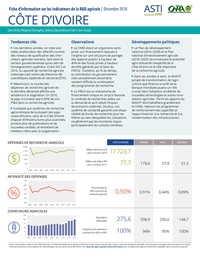Authors:
Léa Vicky Magne Domgho, Sékou Doumbia and Gert-Jan Stads
Year:
2018
Publisher
International Food Policy Research Institute and Centre National de la Recherche Agronomique.
Back to:
Key trends
- Côte d’Ivoire’s agricultural research capacity improved considerably in recent years, both in the government and higher education sectors and both in terms of numbers and qualification levels. Between 2012 and 2016 alone, the country added nearly 80 PhD-qualified agricultural researchers to its workforce.
- Despite these rapid capacity improvements, agricultural research expenditures have remained fairly stagnant over the past decade. In 2016, the country invested 0.50 percent of its AgGDP in agricultural research.
- Compared with most countries in West Africa, Côte d’Ivoire’s agricultural research system is more advanced in terms of physical infrastructure, the number of publications and new varieties it produces, and its linkages with extension.
Observations
- As a semi-private agency, CNRA's financing structure was established based on a 40/60 percent split between government and private funding (through FIRCA). Over time, however, the government share has turned out much lower, making it challenging for CNRA to sustain ongoing research programs.
- Nonetheless, FIRCA is a unique funding mechanism that has made research more demand-driven and less subjected to external pressures. Moreover, the system’s solidarity mechanism ensures the availability of research funds to production sectors (mostly food crops) in which the volume of raised subscription fees is low.
Policy developments
- Both the National Development Plan (2016–2020) and the National Agricultural Investment Plan (2018-2025) recognize Côte d’Ivoire’s untapped agro-industrial potential and the important role of agricultural research.
- WAATP—a large World Bank loan-funded agricultural transformation project—will play an important role in the coming years to accelerate the adoption of new agricultural technologies and innovations. CNRA will be an important beneficiary of WAATP through capacity strengthening programs, research funding, and infrastructure upgrades.

